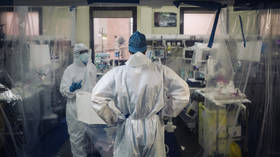ONE IN SEVEN Americans would avoid Covid-19 treatment for fear of cost, even as pricey new pill shows promise against virus
Some 14 percent of US adults would forgo medical care for Covid-19 symptoms because they couldn’t pay for it, a new poll has found – yet oblivious health authorities act as if the epidemic will be solved by drugs alone.
One in seven American adults would avoid seeking healthcare if they or a family member experienced symptoms of Covid-19, out of concern they would be unable to afford treatment, according to a Gallup poll published on Tuesday. Even if they specifically believed themselves to be infected with the coronavirus, nine percent would forgo care for financial reasons, the poll found.
Also on rt.com The Covid-19 pandemic exposes deep flaws in America’s broken healthcare systemTheir fears are well-founded – the average cost of coronavirus treatment in an intensive care unit runs over $30,000, according to a study released earlier this month by insurance industry group America’s Health Insurance Plans. Even for those who avoid the ICU, American healthcare is the most expensive in the world, and stories of coronavirus patients being whacked with gargantuan medical bills are a dime a dozen two months into the pandemic.
Making matters worse is the unemployment crisis, as about 55 percent of Americans receive healthcare through their jobs. Upwards of 30 million have filed for unemployment in the last five weeks, adding an unprecedented number of families to the ranks of the uninsured – which were already estimated in December to include 27.5 million people, more than the population of Australia. Even those lucky enough to have kept their jobs and insurance may face steep co-pays or other surprise costs.
After a handful of highly-publicized cases in which Americans died of the virus after being turned away by hospitals for lack of money, President Donald Trump ordered hospitals to pay for the cost of Covid-19 treatment, and several large insurers promised at the beginning of the month to waive all co-pays for coronavirus testing for 60 days. However, those coverage pledges do not include other costs associated with hospitalization, like ambulance transportation; outpatient treatment; or treatment for non-Covid-19 patients. Individuals seeking treatment have been tested and received the good news that they don’t have the virus – only to be hit shortly thereafter with the bad news that they’re on the hook for thousands of dollars in costs.
Low-income respondents were much more likely to report they would not seek care for financial reasons. Perhaps more troublingly, respondents with annual income under $40,000 were almost four times as likely as those with incomes over $100,000 to report that they or a family member had been turned away from a hospital for reasons related to overcrowding or high patient volume, the Gallup poll found.
While a study of the experimental drug remdesivir as a treatment for Covid-19 published positive preliminary results on Wednesday, such treatment is likely to remain just as far out of reach as existing coronavirus care for many patients. Dr. Anthony Fauci, director of the National Institute of Allergy and Infectious Diseases, nevertheless cheered the results, declaring the trial had “proven” that “a drug can block this virus.”
Also on rt.com US is at a critical juncture, facing TWO EPIDEMICS: Covid-19 & soaring joblessnessAbsent from his victory dance was the fine print that Gilead, the company that owns remdesivir, has been skewered in the past for drug-profiteering, tripling the price of a pill it purchased to treat hepatitis C and charging $2,000 per month for the HIV drug Truvada, which costs $6 per pill to make. Gilead only reversed course on its mission to lock down its patent on remdesivir by securing “orphan drug” status – a coveted designation that bars competitors from developing cheaper generic versions for seven years – after the Food and Drug Administration had already granted the status, triggering tremendous public criticism.
Gilead has tried to combat the bad PR by promising to donate 1.5 million doses of the drug to clinical trials, “compassionate use,” and other programs, but it has refused to commit to making remdesivir affordable. Until it does, all the positive test results in the world may not make a difference to the poorest and most vulnerable patients in the US.
Think your friends would be interested? Share this story!














